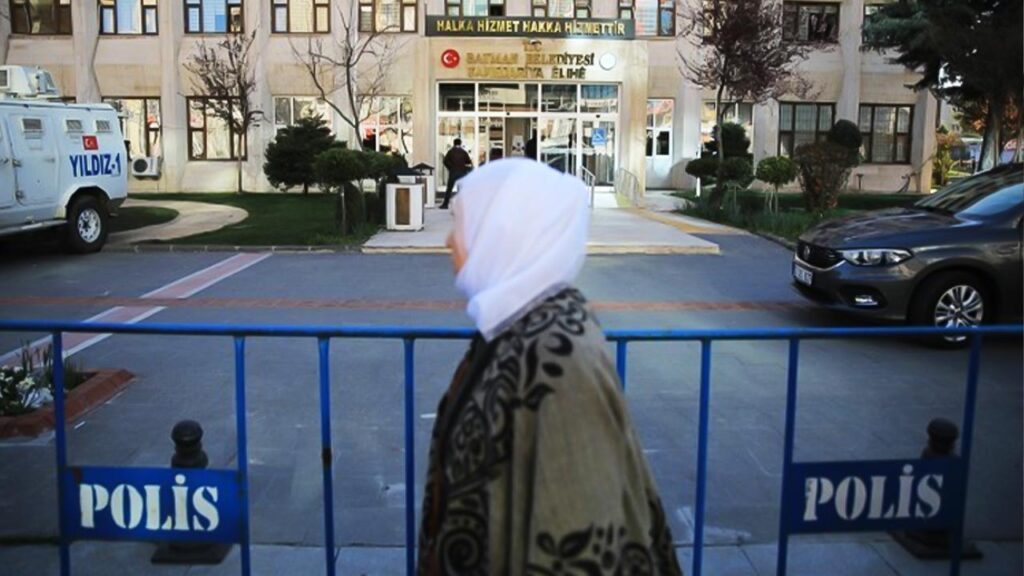
The first article in the Co-Chair system series was entitled “A mechanism that dismantles the power: Co-chair system”. It examined the system that has been implemented by Kurdish political parties for the first time in Turkey, from past to present, to ensure full equality of women and men in politics and it examined the manner in which this political system has transformed politics in Turkey.
The second part of this series examines efforts by the government to eradicate the Co-Chair system.
As highlighted in the earlier article, the form of politics in which the Co-Chair system is at the centre has not only introduced gender equality into the political system but also supported non-hierarchical structures and networks and an anti-government movement. The Co-Chair system which increases the viability of non-hierarchical operational systems and networking at a local level against the centrist structures emanating from the state has been placed under siege by the “centre” and attacked for precisely this reason. This explains the nature of the operations that have been conducted by the centre to repeal this Co-Chair system. This is precisely why the detentions and arrests have begun.
The trustee regime against the Co-Chair system
In 2013, when peace negotiations were ongoing in Turkey, the Co-Chair system was officially accepted, recognised and legally guaranteed. However, with the conflict with the Kurdistan Workers’ Party (PKK) restarting in 2015, the Co-Chair system began to be included in the law as a “crime”. The Democratic Regions Party (DBP), which was the first political party to implement the Co-Chair system at the local level, has faced exceptional pressure since then.
The DBP won 103 municipalities in the local elections in 2014: the Co-Chair system was implemented in 96 of those municipalities. However, as of 11 September 2016, trustees – that is, male bureaucrats appointed by the state instead of the person elected by the voters – began to be appointed in DBP municipalities to replace elected DBP leaders. This process continued without pause. By 25 March 2017, all 95 DBP municipalities were appropriated in this manner by the centre.
According to a DBP report, by December 2017, 2,013 people were fired by trustees, 70 Co-Chairs of the DBP, 27 of whom were women and 81 city councillors were arrested. Women’s centres and shelters were closed. As stated in the DBP report: “The trustees saw themselves as representatives of the central state. They evaluated the municipalities as lands that should be ‘conquered’” and besieged the Co-Chair system. Despite these systematic ongoing obstacles in place, this siege was broken, this time led by the Peoples’ Democratic Party (HDP). In the local elections of 31 March 2019, the HDP won 65 municipalities including three metropolitan cities, five provinces, 46 counties and 12 towns. But immediately after the election, the certificates were not given to six elected municipalities of the HDP. The justification was that they were punished in the previous period by the decree laws issued by the government.
Ultimately, the HDP “officially” won 59 municipalities in the local elections in 2019. It introduced a Co-Chair system in all its municipalities. The number of women council members increased to 363, and the number of women provincial council members increased to 20 in the HDP municipalities. During this period, women’s centres were reopened and cooperatives were established to strengthen and support womens economic situations. Women’s employment increased and a series of activities were initiated to empower women.
However, before long, trustees were brought in, similar to the situation in 2016. First, trustees were appointed to HDP’s Diyarbakır, Mardin and Van metropolitan municipalities on 19 August 2019, and Co-Chairs were arrested. Likewise, this was the case in other municipalities run by the HDP. Finally, a trustee was appointed to the HDP’s Kars Municipality on 2 October 2020. Thus, trustees have been appointed in 48 municipalities of the HDP so far.
According to the HDP’s report, the first actions of these trustees when they took over the municipalities were as follows:
• They abolished the Co-Chair system applied in municipalities.
• They blocked women’s access to municipalities by banning mother tongue services.
• By imposing a sexist division of labour in local governments, they closed the institutions where women came together and produced solutions to their problems. They shut down the mechanisms established for the purpose of addressing women’s issues in the municipality as well as units dedicated to fighting violence against women. They ended the work that was empowering women and providing employment for women.
• They forced women back into their homes and back into precarious jobs.
The threat posed by the Co-Chair system
HDP women often say “an attack on the Co-Chair system is an attack on women” in the face of the pressures exerted on the Co-Chair system. You may ask why. According to Dilan Dirayet Taşdemir, spokesperson of the HDP’s Women’s Assembly, the political power at the centre wants to create a “one man” regime in Turkey and the biggest threat to this is the Co-Chair system. She explains this thesis through a state-father dichotomy: “The father can talk about anyone, he can make any decision, and nobody can question his authority. There is such a vision of the future. In the face of this, there are women who have shaken this authority and these women have developed its system and created its possibilities. As he (Recep Tayyip Erdoğan) says, ‘monism’, they say ‘pluralism’, and he says ‘dictatorship’, women say ‘democracy’”.
As Taşdemir has stated, despite all the pressure on Kurdish politics in Turkey, it tries to keep alive a system that places women at the centre and aims to strengthen local politics through the active engagement of women. Despite everything, the Co-Chair system continues to be a part of politics and to exist.
By Uğur Deniz

